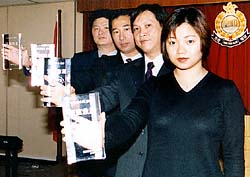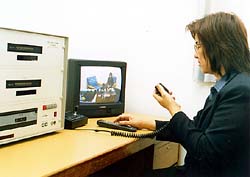



















| |
 Guardian angels:Officers display accolades won for their care and dedication in battling abuse of minors while in the Police CAI Unit |
FOUR
officers have been praised for their dedication and hard work in child sexual abuse
investigations, bringing offenders to justice and providing care for victims.
The officers were presented with trophies featuring engravings hailing them as child saviours, during a recent TV gala show to enhance public awareness on child sexual abuse. "Childcare Extravaganza 1999" was broadcast live on April 4, Hong Kong Children's Day, and organised by the End Child Sexual Abuse Foundation founded by veteran actress Josephine Siao Fong-fong. |
|
The officers were Station Sergeant Law Kam-tong, Sergeant Wong Chi-keung, Police Constable Lam Chun-ming and Woman Police Constable Lam Shun-kin who worked in the Child Abuse Investigation Units (CAIU) in different Regions. SSGT Law is still attached to CAIU, but the other three officers have since transferred. They were praised for their contribution to child protection during their time in CAIU in which they handled victims caringly and professionally, conducted thorough investigations and provided welfare supporting services. Each officer acknowledged it was a complicated social issue with intertwining causes, and all had learned something from handling such cases. "The cases we handled were invariably involving a kind of close relationship beween the victims and the abusers, who would be their parents, guardians, coaches, or teachers," Mr Law said. "You could see how emotionally close they were to each other, and how difficult it could be for us to gather information. "Some people might think child sexual abuse could only happen in broken families but the truth is, it can happen in any family," he said. What made the difference in handling sexual cases from other abuses was that most people were more willing to co-operate with Police and provide information in the latter situation. However when it came to sexual abuse, especially in schools and families, those involved were more likely to keep quiet. This was especially true in the cases of teenage girls being abused by their fathers. The girl may understand what happened, but may not be willing to testify. Family members would be shocked when they first came to know of the reported abuse. They may be afraid of losing the bread winner, if they are the offender, and pressure the victim into silence. According to SGT Wong Chi-keung, co-operation concerns also arose in cases involving schools. "Once we investigated a report about a primary school girl allegedly sexually abused by a teacher. "Worrying the school might be ruined by the case, the principal refused to facilitate our investigation and dismissed the teacher. | |
|
"And probably under pressure from the school, the girl's parents also went silent making it impossible for us to continue our investigation," Mr Wong said. PC Lam Chun-ming said as children were vulnerable, most people believed only women officers could conduct abuse investigations well, particularly sexual ones. But he said this was not really true. A glance at the CAIU in all Regions revealed there were as many male officers as women, and they all did their job professionally. |
 Video-recording facilities offer abused kids a friendlier environment to make statements |
|
"When it comes to talking to small kids to find out what actually happened, it all depends on your patience, sincerity, caring attitude and interview skills. I don't see any problems for male offices to do the job as long as they can master what is required," PC Lam said. Since the revision of the Criminal Procedure Ordinance in July 1995, children have been allowed to give statements via video recordings. CAIUs were set up in all Regions and youngsters were arranged to give evidence in the Video Recording Suites, which feature a warm and friendly setting. The video tapes are presented as evidence in courts. WPC Lam Shun-kin has become an expert in taking video statements from children. "Video recording of an interview can be difficult. No leading questions can be asked and the process has to be completed in one go. What's more, we have to be very careful about children's emotions during the process. All that amounts to considerable pressure on a police officer. "It was quite difficult for some youngsters to concentrate during the interview as they could soon become bored and uncooperative. It was thus important for officers to get as much information from them as possible within a limited period of time, while keeping an eye on their emotional well-being,Ó Ms Lam said. With child sexual abuse cases, investigation and prosecution by Police only made up part of the task. Input from professionals such as social workers and clinical psychologists was indispensable. "Upon completing the investigation for a particular case, we would organise a case conference with the experts to gather their views on it, and then decide whether or not to prosecute the offender," Mr Law said. "Irrespective of prosecution, we would be very concerned about the well-being of the victims and work out an appropriate counselling and welfare plan for them, such as applying for Care and Protection Orders for taking them to places where proper care was available." Police could never win if left to battle child sexual abuse alone. Schools, medical personnel, social workers and psychologists all had a role to play. CAIU officers share their experiences with professionals in regular meetings, meet school teachers and representatives of various organisations, and participate in publicity events to spread awareness of child sexual abuse prevention. Superintendent of the Child Protection Police Unit Maria Siu said: "These were exactly what the four officers had been doing, during and after working hours. Not only were their Police duties of a very high standard, they really had their hearts in the child protection cause. Their commendations from the ECSAF were also recognition of the Force's hard work in fighting against child sexual abuse." | |

